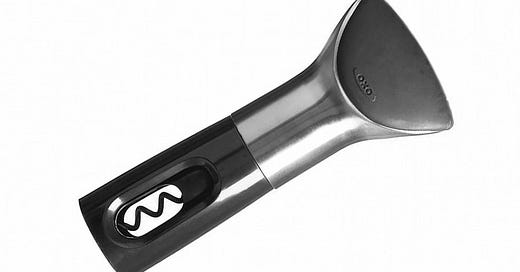Welcome to Just Two Things, which I try to publish daily, five days a week. Some links may also appear on my blog from time to time. Links to the main articles are in cross-heads as well as the story.
#1: Trapped in a world of stuff
There is a terrific piece at the Real Life site by the writer Kelly Prendergast on our relationship with all the stuff we fill our houses with. I’m not going to be able to do justice to it here, but it starts with her Oxo corkscrew (“corkpull”, in American), given to her as a gift, which competes for space in her kitchen drawers with a couple of other corkpulls. But it is well-made, it works well, and it was a gift:
Life would be simpler if it had never entered the house, but between the gift-ness and its unfortunate excellence at performing its single task, I haven’t been able to get rid of it. Marcel Mauss, in his inquiry into the anthropology of the gift, asks “What power resides in the object given that causes its recipient to pay it back?” The gift corkscrew is freighted with a psychic weight that can’t be directly repaid, but can’t be forgotten.
Her reflections on all these things help her to pull back to see her kitchen as part of a much bigger system—one which needs to make things, use them, or not, and then replace them, to keep on functioning:
“Every single thing you see is future trash,” says Robin Nagle, anthropologist of material cultures and anthropologist-in-residence at the New York Department of Sanitation. This system that “not only generates so much trash, but relies upon the accelerating production of waste for its own perpetuation” is big and cruel. The corkpull is a tiny piece of flotsam on a tide of material that flows through ships, stores, houses, hands, and all I can do is try desperately to manage the rivulet running through my own life. I hate it here.
Perhaps it is not surprising, then, to learn that there is an emerging academic field called “discard studies” that tries to understand cultures of waste.
And surfing through all of this world, as we talk about reduce, re-use, and recycle, is the chimera of the circular economy, in which everything either becomes a nutrient, and goes back to the soil or becomes a raw material for some other production process. But even as we imagine it, knowing how complex our objects are, we know how unlikely it is unless we also change our relationship with all of these things:
The dream that objects can be cycled back into innocent inputs is powerful and poignant... I imagine my $10 Target toaster ratcheting apart like an exploded view diagram, each component labeled and registered and ready to be redeployed, flying off to a new home in some other toaster or modular appliance. ... As it filters out into strategic plans and corporate discourse, the circular economy threatens to become subsumed by empty jargon, a wishful framework that serves to unburden producers of the responsibility to account for their material impacts.
As well as discard studies, consumerism has also created a new genre of “critical logistical and supply chain studies”, which seeks to make supply chains visible:
“If the corporate goal is to build a supply chain so seamless that its existence barely registers with consumers, such researchers seek to turn this process inside out, exposing the human and environmental costs obscured by slick design and packaging,” writes Jackie Brown in her recent essay surveying the field of supply studies... In both critical logistics studies and the more Q-addled corners of the internet, people are driven to distraction trying to reverse-engineer a system that is purposely obscured, piecing together clues to see who’s behind the curtain and how we’re being screwed.
The article is a fine combination of reflection, narrative, and context. As well as consumption, it touches on notions of gift, and of craft, via the articst Mike Kelley and the singer Bjork. It’s well worth reading in full.
In a related note, The Hedgehog and the Fox has a podcast interview with Jennifer Howard on her book Clutter in which she traces this cultural obsession with material clutter back to 19th century England—noting the material detail in Dickens’ novels, for example.
(H/t for the article to The Browser)
New campaigns are usually a sign of an issue that is gaining attention or momentum, so it is worth noting the launch of Screen Burn, designed to reduce our screen use and therefore some of its adverse effects.
Joe Ryle, co-founder of Screen Burn, says the organisation is the first of its kind... Whilst attentive to the many important benefits of digital technology, Ryle and the co-founders of Screen Burn believe there is an urgent need for more awareness, research, campaigning and regulation around the impact of excessive screen time and addiction. “We think it’s having all kinds of negative side effects in terms of mental health, destroying our attention, causing our brains to be in a constant state of distraction,” he says. “All of these things would suggest that screen overuse and addiction should be seen as a public health issue.”


Screen Burn intends to build awareness around issues such as excessive screen use and addiction, and campaign for more guidance and regulation on ethical and public health grounds. This might include ‘right to disconnect’ laws, and governments holding tech companies to account for their impact on people’s wellbeing.
It’s just worth noting the language here, which is part of a pattern: campaigners making visible the external costs of digital technologies, and inviting governments to act to curb them.
j2t#096
If you are enjoying Just Two Things, please do send it on to a friend or colleague.



